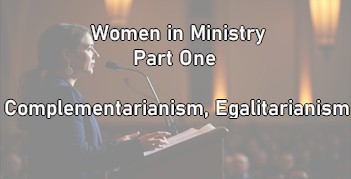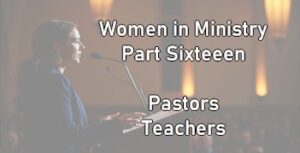Complementarianism, Egalitarianism, AND?

Women and Ministry, Part One
Complementarianism, Egalitarianism, what is the difference and is there another perspective when it comes to women evangelizing, preaching and teaching? I will not be able to cover all this in this article, but I want to at least define some terms and give full disclosure where I am coming from on this topic. I think there is a third option that lines up with biblical principles. But right off the bat I am not saying my position is a biblical doctrine. I will explain more later.
Complementarianism
Complementarianism believes men and women are equal in personhood. There is no difference in worth. Rather, proponents of complementarianism believe that men and women have separate, though equal, roles in marriage, family life, the church, and elsewhere.
Complementarianism holds that masculinity and femininity were created by God as meaningful distinctions indicating different roles that, when embraced, will lead to the best possible spiritual well being for believers. (Gender matters)
Complementarianism believes that only men should hold church leadership positions over other men. Usually, women may hold positions that do not place them in authority over men. Thus women are never to preach or teach from the pulpit or anywhere else where there are men.
Complementarianism does not encourage or support any form of abuse of women by males, or ungodly mindsets regarding submission. However, there are those who come from the Complementarianism Camp that lean towards misogynist type beliefs and actions.
Egalitarianism
Egalitarianism agree with complementarians that men and women are equal in worth. However, egalitarianism goes further to state that men and women are considered equal in role capabilities as well; there are no gender restrictions on what roles men and women can fulfill in the church, home, and society. This view holds that the teachings and attitudes of Jesus and the New Testament abolished gender-specific roles as well as roles related to class and race.
Egalitarianism believe men and women can both hold church leadership positions. Roles should be ability-based and not gender-based. Thus women can be in the pulpit and evangelize, preach, teach.
Egalitarianism in itself does not support homosexuality, transgenderism, women usurping authority over men, etc but there are those who come from the Egalitarianism Camp that if they err, it is in these areas.
Complementarianism and Egalitarianism
When it comes to women in leadership roles, women in ministry, women evangelizing, preaching, and teaching, is there a third option? Is Scripture as black and white as the two camps make it to be? I would say ‘YES there is a third option!” The fact that both camps can use Scripture to defend their positions and to ‘discredit’ each position makes it clear that there must be a third option. More importantly I believe Scripture if rightly interpreted without bias and prejudice offers a third position.
Isorropíaism
The third option I am calling Isorropíaism. I am playing off the Greek word Isorropía which translates to balance in English. I believe if one lets Scripture interpret Scripture, if scripture context is taken seriously, if the historical and culture context is taken seriously, there is a balance between the ‘extremes’ of Complementarianism and Egalitarianism. I believe any sincere Christ Follower that is committed to Scripture alone and not camps or denominations, are more likely to lean towards Isorropíaism. So what is Isorropíaism? I will clearly define it in my next blog article. Hopefully I can show there that it is not either Complementarianism OR Egalitarianism, but Isorropíaism.
WARNING
If you are deciding if a person is a Christian or not, if a person believes in the inerrancy of Scripture or not, based upon if they support complementarianism or egalitarianism, you are treading on dangerous ground. Salvation is not based upon rather women can evangelize, preach, and teach.
Women in Ministry Series
Women in Ministry, Introduction-Why the Topic?
Part One-Women in Ministry-Complementarianism, Egalitarianism, And?
Part Two-Women in Ministry-Isorropiaism-HUH??? Balance
Part Three-Women in Ministry-Bible Passages
Part Four-Women in Ministry, Extremism
Part Five-Women in Ministry-No Speak
Part Six-Women in Ministry, Prophecy
Part Seven-Women in Ministry-Spiritual Gifts
Part Eight-Women in Ministry-Examples
Part Nine-Women in Ministry-Headship
Part Ten-Women in Ministry-Calling, Gifting, and Anointing
Part Eleven-Women in Ministry, My Position
Part Twelve-Women in Ministry, 1 Timothy 2:8-15
Part Thirteen-Women in Ministry, 1 Timothy 2:8-15, Conclusion






